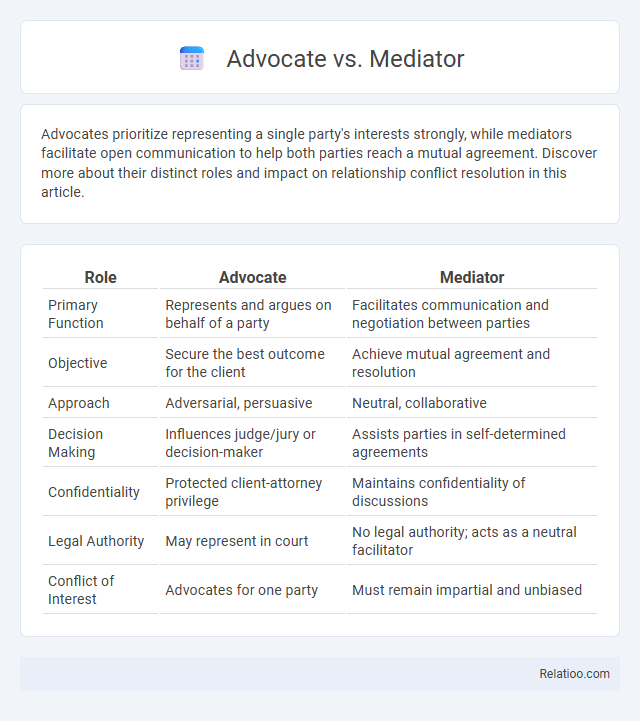Advocates prioritize representing a single party's interests strongly, while mediators facilitate open communication to help both parties reach a mutual agreement. Discover more about their distinct roles and impact on relationship conflict resolution in this article.
Table of Comparison
| Role | Advocate | Mediator |
|---|---|---|
| Primary Function | Represents and argues on behalf of a party | Facilitates communication and negotiation between parties |
| Objective | Secure the best outcome for the client | Achieve mutual agreement and resolution |
| Approach | Adversarial, persuasive | Neutral, collaborative |
| Decision Making | Influences judge/jury or decision-maker | Assists parties in self-determined agreements |
| Confidentiality | Protected client-attorney privilege | Maintains confidentiality of discussions |
| Legal Authority | May represent in court | No legal authority; acts as a neutral facilitator |
| Conflict of Interest | Advocates for one party | Must remain impartial and unbiased |
Understanding the Roles: Advocate vs Mediator
Advocates actively represent and defend the interests of their clients, often in legal or social contexts, while mediators facilitate communication and negotiation between conflicting parties to help them reach a mutually acceptable resolution. The advocate's role involves persuasion and argumentation on behalf of one party, whereas the mediator remains neutral, guiding discussions without imposing decisions. Understanding these distinctions is crucial for selecting the appropriate approach in conflict resolution and legal support.
Core Functions of Advocates
Advocates primarily focus on representing and supporting Your interests by actively promoting rights, providing legal advice, and negotiating on Your behalf. Unlike mediators who facilitate communication and help parties reach mutual agreements without taking sides, advocates engage directly to champion Your cause in various settings, including legal, social, and healthcare arenas. The core functions of advocates involve empowerment, resource connection, and assertive representation to ensure Your voice is heard and rights are protected.
Key Responsibilities of Mediators
Mediators facilitate open communication and guide disputing parties toward mutually agreeable solutions without imposing decisions, ensuring impartiality throughout the process. Their key responsibilities include managing dialogue, fostering understanding, and helping clarify issues to promote consensus and preserve relationships. Your role as a mediator centers on neutrality, confidentiality, and empowering parties to collaboratively resolve conflicts.
Advocacy: Representing Client Interests
Advocacy involves actively representing and defending a client's interests in legal, social, or professional settings, ensuring their rights and needs are communicated effectively. Unlike mediators who facilitate negotiation between parties without taking sides, advocates take a decisive role in arguing on behalf of their clients. Effective advocacy requires a deep understanding of the client's goals, strategic communication skills, and a thorough knowledge of relevant laws and policies.
Mediation: Facilitating Neutral Resolution
Mediation involves a neutral third party facilitating communication between disputing parties to reach a mutually acceptable resolution without imposing decisions. Unlike an advocate who represents and supports Your interests or advocacy that promotes specific causes, a mediator remains impartial, helping clarify misunderstandings and explore solutions. This process enhances collaboration, reduces conflict intensity, and often leads to faster, cost-effective dispute resolution.
Skills Required for Advocacy and Mediation
Effective advocacy demands strong communication, negotiation, and analytical skills to represent and advance your client's interests persuasively. Mediation requires skills in active listening, impartiality, and conflict resolution to facilitate agreements between disputing parties. Both roles benefit from emotional intelligence and cultural competence to navigate complex interpersonal dynamics successfully.
Situations Best Suited for Advocates
Advocates are best suited for situations requiring strong representation in legal, social, or political disputes where Your rights or interests need vigorous defense and negotiation. They excel in environments demanding specialized knowledge, such as courtroom proceedings, legislative lobbying, or individual client support. Unlike mediators who facilitate negotiation between conflicting parties, advocates actively champion Your cause to achieve favorable outcomes.
Cases Where Mediation is Most Effective
Mediation is most effective in disputes involving emotional conflicts, family matters, or workplace disagreements where preserving relationships is crucial, as it encourages open communication and collaborative problem-solving. Unlike advocacy, which involves representing your interests in court, mediation offers a confidential and informal environment to reach mutually satisfactory agreements without the need for litigation. Choosing mediation can save time and costs while fostering lasting resolutions tailored to the specific needs of all parties involved.
Legal and Ethical Boundaries
Advocates operate within strict legal frameworks representing clients' interests in formal settings, while mediators facilitate dispute resolution impartially without taking a side or providing legal advice, maintaining neutrality. Advocacy involves actively supporting a party's position, which requires adherence to ethical guidelines to avoid conflicts of interest and uphold confidentiality. Understanding these distinct roles and boundaries ensures compliance with professional standards and promotes fair legal processes.
Choosing Between Advocacy and Mediation
Choosing between advocacy and mediation depends on your desired outcome and communication style. Advocacy involves actively representing and supporting your position to influence decision-makers, while mediation facilitates a neutral third party to help parties find mutual agreement. Understanding whether you need assertive representation or collaborative conflict resolution will guide you in selecting the most effective approach for your situation.

Infographic: Advocate vs Mediator
 relatioo.com
relatioo.com